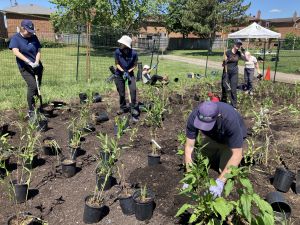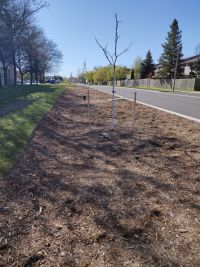Construction: plant material verification and installation
Revision as of 15:35, 30 September 2022 by SamanthaPelayo (talk | contribs)
A healthy and vibrant vegetation structure provides itself with nutrients to sustain growth. Additionally, it holds, and retains water and oxygen, and binds and degrades pollutants. When selecting plants, consider the following:
- Native species need fewer inputs and are better adapted to local climate and soils.
- Larger plant stock should be considered and prioritized in areas of frequent ponding and concentrated flows.
- Trees, shrubs, grasses, sedges and/or rushes present unique benefits and limitations in LID facilities. For example, debris from trees/shrubs may block outlets, but their size and form of planting can provide superior establishment in challenging locations.
- Planted plants in a moderately diverse cluster of plants are more easily maintained and more visually accepted and pleasing to the general public.
- A planting plan should include species that tolerate harsh conditions (e.g., drought, water inundation and/or salt). Most riparian plant species will do well in rain gardens, bioswales and bioretention facilities.
During installation:
- Time of planting: It is crucial for plant survival and thriving, avoid at all times planting during summer months with higher temperatures (July and August) and winter months (November - March). Consider planting early in the spring (April - June) or late in the fall (September - October).
- Planting depth: Plant each plug/tree or shrub to the desired depth as per design considerations. For small plants, it is recommended to use small tools such as a hand trowel.
- Plant substitution: Any changes in the species delivered during construction must be accepted by the designer and/or supervision team before installing.
- Trees/Shrubs protection: If any trees/shrubs need protection, ensure that they receive it by installing proper tree guards.
- Irrigation: It is recommended for the plant material to receive additional watering right after planting if no rainfall event occurs. Also, plant material should be watered during the summer months or during drought periods for two years after planting.
- Fertilizers: The use of these products is acceptable, as long as they are applied properly.
- Pesticides: It is recommended to only use if needed.
For more information regarding plant selection, refer to Plant lists and Plant selection.

